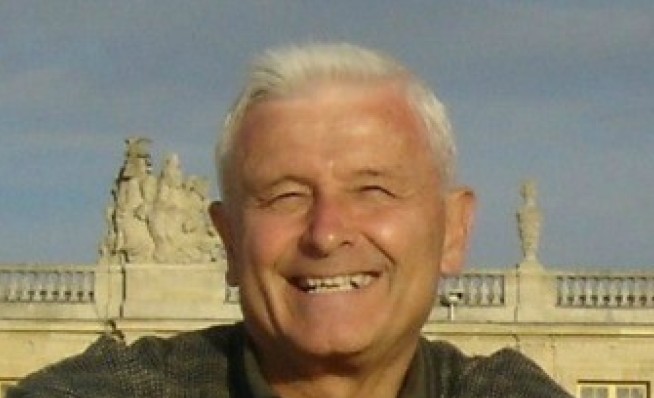Dr Christopher Eriksson (Physics 1965, PhD Materials Science 1969), has enjoyed a vibrant international career since his time at the College, as an educator, researcher, author and most recently, counsellor for neurodiverse young adults.
Read on to discover more about Dr Eriksson’s life and interests so far, and why he would encourage anyone to consider studying physics at Imperial.

Why did you choose to study physics at Imperial?
Firstly the College’s reputation - at the time there were a few Nobel winners in the Department of Physics alone.
Secondly, the subject of physics to me has always felt like one of the best ways to study and understand life.
I knew that I wanted to study physics, at Imperial.
What was the best part of your course and what was the most challenging?
My course had very good teaching staff. The volume of work was a challenge!
What extra-curricular activities were you involved in?
I was involved in the Imperial College Union activities and I ran the Imperial College Debating Society for a couple of years. I also participated in University Challenge, which was fairly new back then.
Who did you find inspiring at Imperial and why?
Professor Patrick M.S. Blackett, Nobel laureate. I remember well his inspiring talk to welcome my class, back in 1962. Professor Blackett stood out to me as a great visionary. At the time he felt it was important for the UK to produce more engineering entrepreneurs.
What is your fondest memory of your time here?
Making great friends. Also, getting my PhD accepted for publication in the science journal, Nature.
What is your favourite place at Imperial and why?

Beit Quadrangle. The north side of Beit Hall's quadrangle is home to Imperial College Union, where I fondly remember attending formal dinners and debates. I also have good memories of my time at Falmouth Hall.
I have included some of my other favourite places at Imperial in my historical novel 'Shakespeare and the God Virus', which is currently being reprinted.
Tell us about your career journey since graduating.
After completing my PhD, I got a European Molecular Biology (EMBO) postdoctoral fellowship at The Karolinska Institute in Stockholm. I then got married in Stockholm and held various university teaching and research positions in the fields of biomaterials in medicine and dentistry, eventually ending up as Professor of Biomaterials at McGill University in Montreal, and Director of a CAD/CAM institute.
Later, I went on to obtain an MA in counselling psychology from Adler University in Chicago to become a counsellor.
What does a typical day look like for you now?
Before the COVID-19 pandemic, I was counselling neurodiverse young adults for 3-4 hours daily, helping to prepare them for the workplace.
At the moment, I typically participate in online training and publish papers on the science behind Shakespeare’s sonnets.
What have been your career highlights and lowlights so far?
Having the opportunity to join the People to People International programme on a scientific trip to China has definitely been a highlight of my career.
Lowlights include leaving South Africa for Canada to teach physics at a high school in Montreal. With an international reputation as a biophysicist, my ego was a little bruised.
How has what you learnt at Imperial helped you in your career so far?
Imperial gave me the confidence and courage to take on new challenges, such as running a CAD/CAM institute, and facing the uncertainties over moving to a new country.
Imperial also taught me that it is important to never stop learning new things - like superstring theory!
What are your plans for the future?
I have just published a new article this year (2021) in Rose-Croix Journal called: 'Shakespeare in Tune with The Symphony of Nature in a Single Note – Birth to the Fair Youth of the Sonnets', which features the harmonic series in mathematics and music and gives new meaning to Sonnet 8, plus touches on superstring theory. It is also available here.
The same journal also published another article of mine last year: 'Adler and Shakespeare – Life Coach, Visionary, Leader'. Based on this particular article I am starting to work on developing practical examples for those doing trans-cultural counselling, with the International Association for Counselling.
Rose-Croix Journal is a peer-reviewed scientific journal crossing several disciplines - spirituality, psychology, and philosophy to name a few. The journal reflects my work and interests well, including my interest in the holistic work of physicist David Bohm on consciousness.
In the future I want to spend more time exploring the harmonic series in nature, not just in music and mathematics, but the holographic theory of the universe and consciousness (see work of David Bohm and Brian Greene).
What would be your advice for current students?
Just believe in yourself and trust yourself. 'Mistakes' are just experiences needed to help us reach the goals we have set.
What would be your advice to students considering studying physics at Imperial?
Go for it. Physics is a great way to begin a career, and Imperial has such a great international reputation. There are so many different paths you could take once you've got a physics degree.
What makes you proud to be an Imperial alumnus?
Imperial’s high standards, international reputation, and the way that my Imperial experience has stuck with me throughout life’s challenges.
Do you have a favourite quote, or anything else you'd like to share?
“We would achieve more if we knew less about what is impossible.” - Monsieur Le Marquis Nicolas de Condorcet
I'd also like to share the name of my favourite painting: Krishna - Spring in Kulu, by Nicholas Roerich.
What advice would Dr Eriksson give to current students?
"Just believe in yourself and trust yourself. 'Mistakes' are just experiences needed to help us reach the goals we have set."